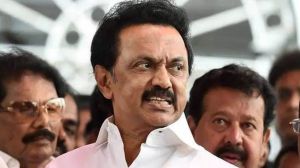United against terrorism
The simple landmark resolution passed unanimously by both Houses of Parliament sends out the message that India would 8220;fight against su...

The simple landmark resolution passed unanimously by both Houses of Parliament sends out the message that India would 8220;fight against such senseless acts of terrorism8221; that we have been victims of 8220;in a united and determined manner.8221; Parliament commits the government to end the menace of terrorism from across the borders. The bottomline is that we ourselves would have to combat terrorism. But we would expect the international community to understand and co-operate in this process. The unanimous resolution expresses the national will and would have to be read in that context. The problem is that Pakistan, in all likelihood, would simply ignore this essentially because its army rulers may not really understand the import of such democratic expressions since they are not used to them and even hold political systems and democracy in contempt. But they should at least understand that any action taken by India now has the unanimous support of Parliament and cannot be interpreted as compulsions of domestic politics.
The United States as the de-facto leader of the international community and itself a victim of terrorism emanating from the Pakistan-Afghanistan axis needs to reassess its policy towards Islamabad. While it may be desirable to build up Pakistan8217;s shattered economy to help greater stability, time has come to examine whether the international community is getting value for the money it is pumping into Pakistan. The assumption has been that this would not only help to reform the social and economic system but would be a strong direct incentive to General Musharraf to co-operate in the war against terrorism. Pakistan8217;s economic situation has improved markedly as a consequence of this assistance. But it is not fulfilling its part of the bargain as the US and its allies like France know very well. The US needs to recall its own ultimatum to Pakistan after September 11 and assess the progress against promises. Certainly terrorism emanating from Pakistan into India has increased in intensity and frequency in spite of Musharraf8217;s promises to roll it back.
The international community is aware that Pakistan8217;s progress towards democracy has proved to be a farce as the referendum showed. Its co-operation on war against terrorism is well below what is expected and possible. Time, therefore, has come for the international community to review the flow of economic assistance to the army regime to convince them of the need for change. Such a review would also help in slowing down India8217;s inevitable march towards the military option to alter Islamabad8217;s terrorism policy. For India the option to use military power to increase the cost to Pakistan of its policy of terrorism would remain available while it explores other choices. But economic measures also constitute a part of the available options and some of them could help to change the mindset in Islamabad. We need to re-examine the commitment to continue implementing the provisions of the Indus Waters Treaty signed four decades ago. This is a patently unfair treaty for distribution of water from the rivers of J038;K and Himachal Pradesh when we face prospects of increasing deficiency of water in J038;K, Punjab, Haryana and Rajasthan.
- 01
- 02
- 03
- 04
- 05































